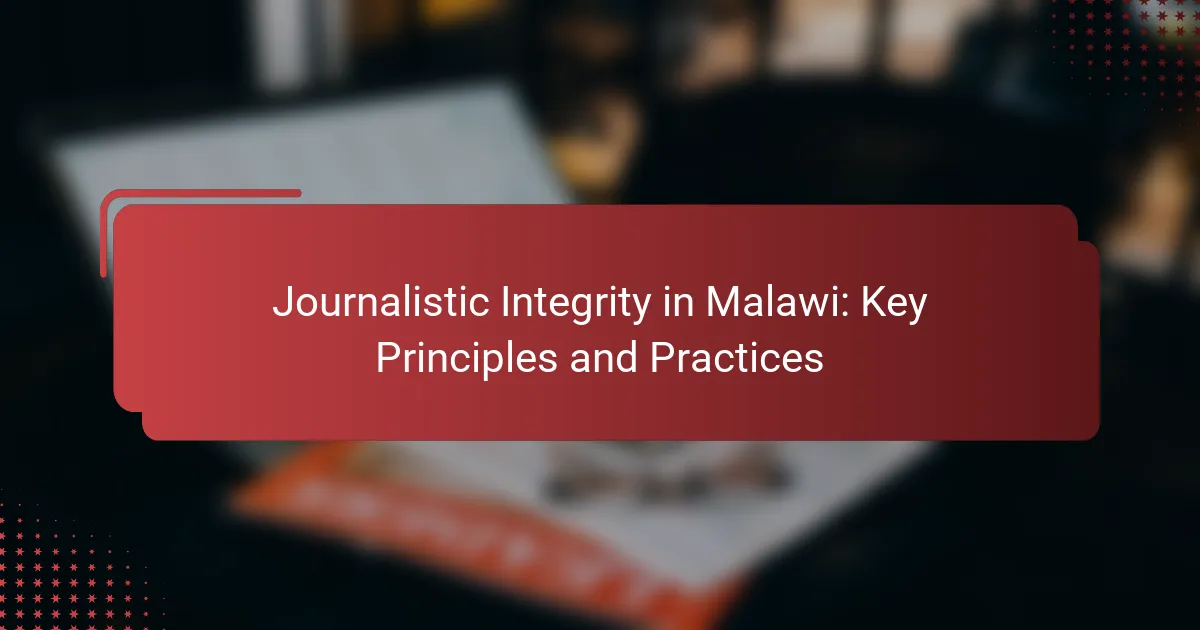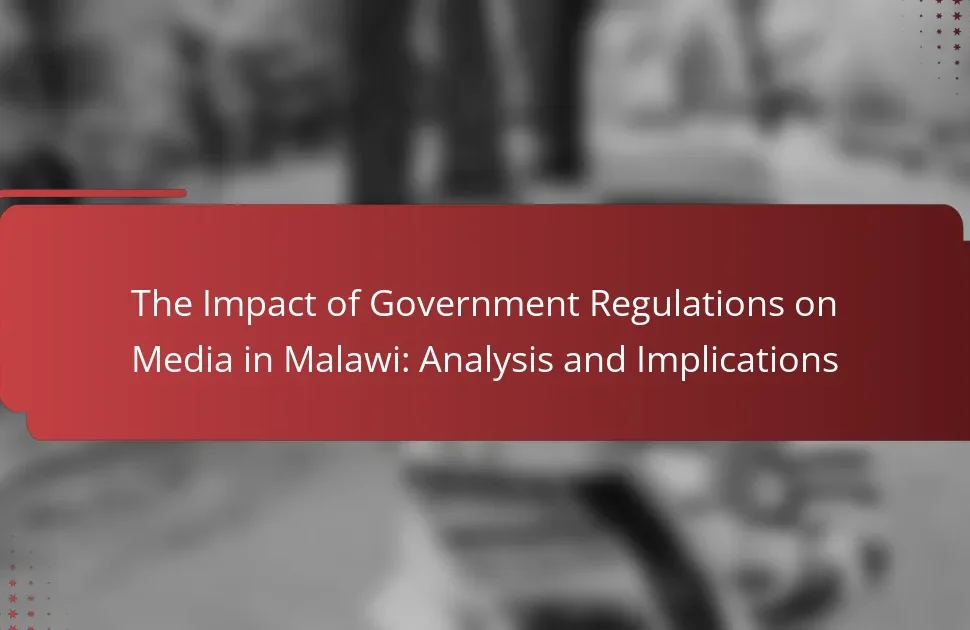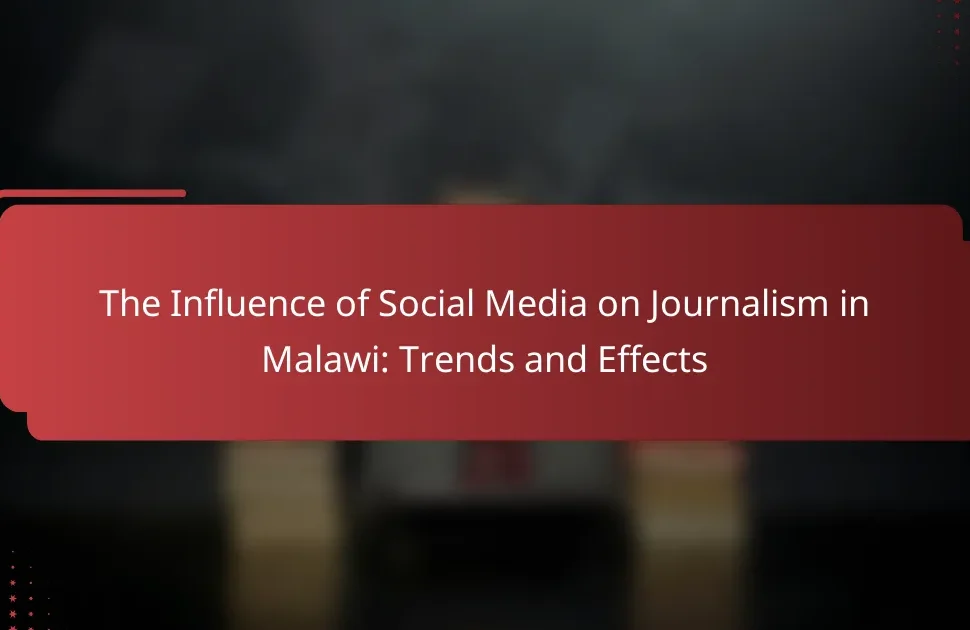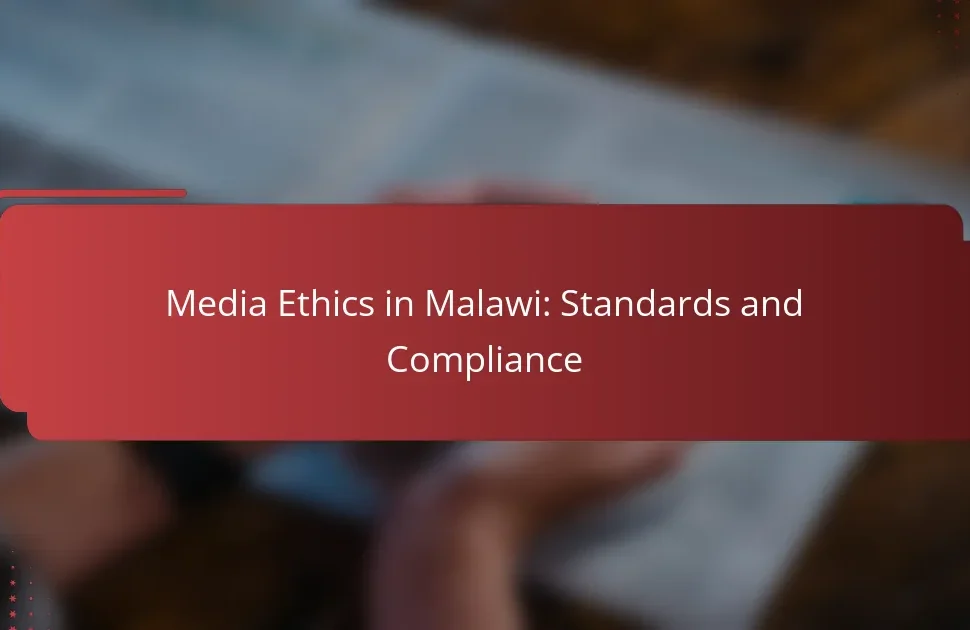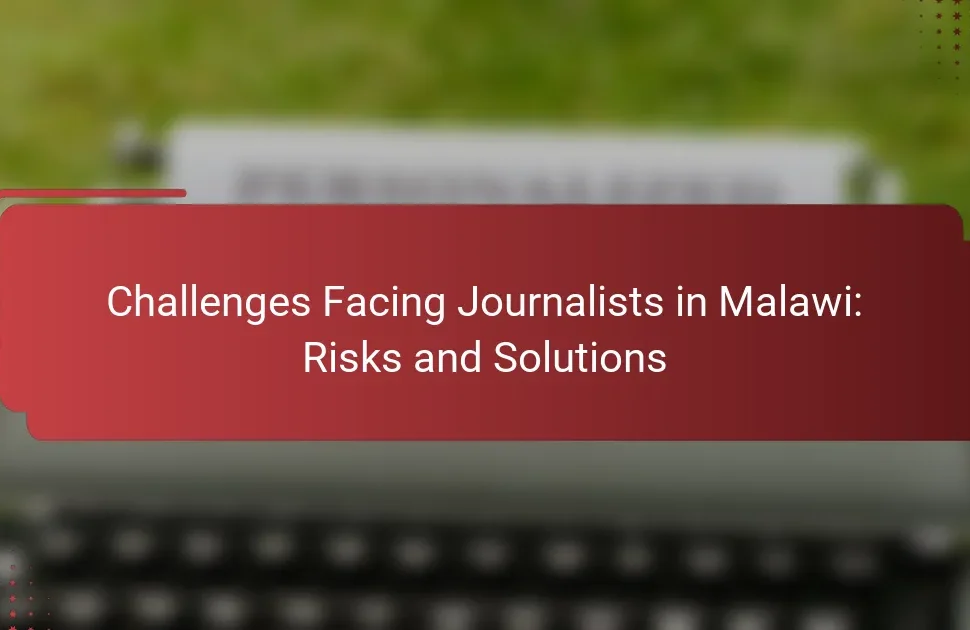Journalistic integrity in Malawi encompasses key principles such as accuracy, fairness, accountability, and independence. These principles are essential for fostering public trust in the media and align with the guidelines set by the Malawi Communications Regulatory Authority. The article outlines best practices that support these principles, including adherence to ethical standards, fact-checking, and transparency, as promoted by the Malawi Journalists Association. Furthermore, the impact of journalistic integrity on society is discussed, highlighting its role in enhancing civic engagement and informed decision-making among citizens. The relationship between media credibility and public perception of governance is also examined, underscoring the importance of maintaining high standards in journalism for the advancement of democracy and social progress in Malawi.
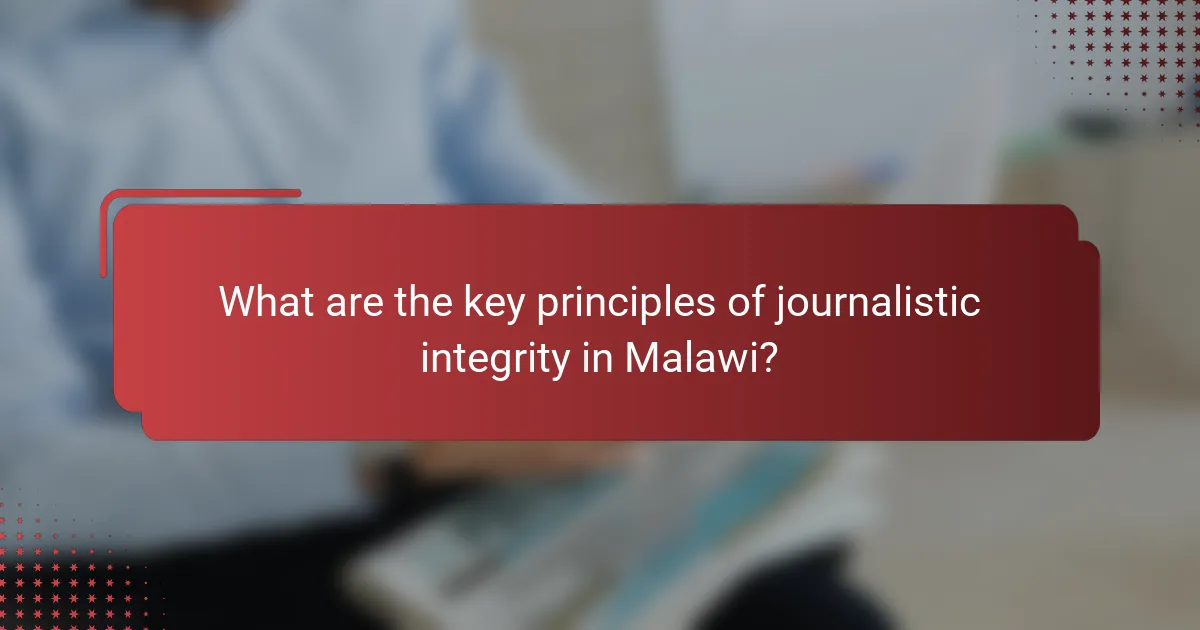
What are the key principles of journalistic integrity in Malawi?
The key principles of journalistic integrity in Malawi include accuracy, fairness, accountability, and independence. Accuracy requires journalists to verify facts before publication. Fairness involves presenting all sides of a story without bias. Accountability means journalists must take responsibility for their work and correct errors. Independence ensures that journalists operate free from outside influences, including political or commercial pressures. These principles are essential for maintaining public trust in media. They align with the Malawi Communications Regulatory Authority’s guidelines, which promote ethical journalism standards.
How is journalistic integrity defined in the context of Malawi?
Journalistic integrity in Malawi is defined as the adherence to ethical standards and principles in reporting. It encompasses accuracy, fairness, and accountability in journalism. Journalists are expected to verify information before publication. They must provide balanced perspectives, especially on sensitive issues. The Malawi Constitution supports freedom of expression, which underpins journalistic integrity. However, challenges like censorship and political pressure can undermine these principles. A 2020 report by the Media Institute of Southern Africa highlighted ongoing threats to press freedom in Malawi. This context emphasizes the need for strong ethical practices among journalists.
What core values underpin journalistic integrity in Malawi?
Core values that underpin journalistic integrity in Malawi include accuracy, fairness, accountability, and independence. Accuracy ensures that information reported is factual and reliable. Fairness involves providing balanced coverage and representing diverse viewpoints. Accountability requires journalists to take responsibility for their work and correct any errors. Independence emphasizes the need for journalists to operate free from external pressures and influences. These values are crucial for maintaining public trust in the media. They also align with international standards set by organizations such as the International Federation of Journalists.
How do these values manifest in journalistic practices?
Journalistic values manifest in practices through adherence to accuracy, fairness, and accountability. Journalists in Malawi strive to report facts accurately, ensuring that information is verified before publication. Fairness is maintained by presenting multiple perspectives on issues, which fosters balanced reporting. Accountability is emphasized by journalists owning up to mistakes and correcting them promptly. These practices uphold public trust in media. For instance, the Malawi Communications Regulatory Authority enforces guidelines that promote ethical reporting standards. This regulatory oversight reinforces the commitment to integrity in journalism.
Why is journalistic integrity important for democracy in Malawi?
Journalistic integrity is crucial for democracy in Malawi because it ensures accurate and unbiased reporting. This integrity fosters public trust in the media. Trustworthy journalism informs citizens about government actions and societal issues. In Malawi, where political corruption is a concern, integrity helps hold leaders accountable. It also promotes transparency and encourages civic engagement. Research indicates that media freedom correlates with democratic development. A study by the Media Institute of Southern Africa highlights that strong journalistic practices can strengthen democratic institutions in Malawi. Thus, journalistic integrity underpins a healthy democratic process by empowering informed citizenry.
What role does journalism play in promoting transparency and accountability?
Journalism plays a crucial role in promoting transparency and accountability. It acts as a watchdog for society. Journalists investigate and report on issues that affect the public. This scrutiny encourages government and corporate accountability. For example, investigative journalism can expose corruption or mismanagement. Such reporting can lead to public outcry and reforms. Transparency is enhanced when information is disseminated widely. Access to accurate information empowers citizens to make informed decisions. Therefore, journalism is essential for a healthy democracy and societal progress.
How does journalistic integrity contribute to public trust in media?
Journalistic integrity enhances public trust in media by ensuring accuracy and accountability. When journalists adhere to ethical standards, they provide reliable information. This reliability fosters a sense of credibility among the audience. Research indicates that 68% of people are more likely to trust media that follows ethical practices. Transparency in reporting also builds trust. When media outlets disclose their sources and methods, it reinforces their commitment to truth. Furthermore, consistent ethical behavior by journalists encourages audience loyalty. This loyalty translates to a more informed public, which is essential for a functioning democracy.
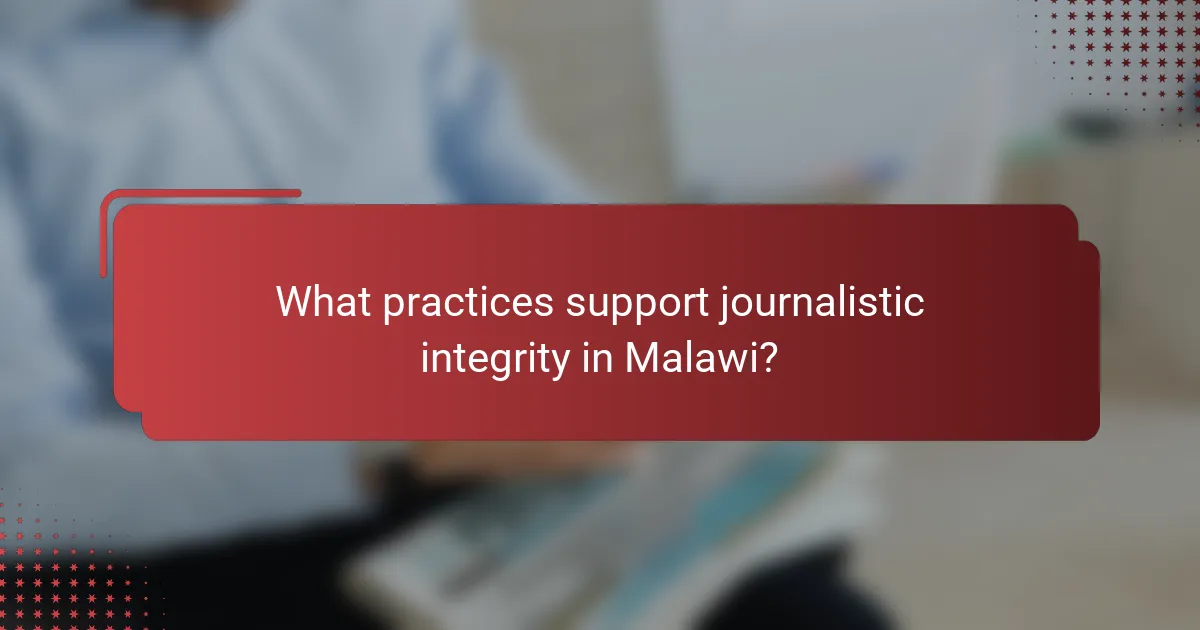
What practices support journalistic integrity in Malawi?
Practices that support journalistic integrity in Malawi include adherence to ethical standards, fact-checking, and transparency. Journalists are encouraged to follow the Malawi Journalists Association code of ethics. This code emphasizes accuracy, fairness, and accountability in reporting. Additionally, many media organizations conduct training sessions on ethical journalism. These sessions focus on the importance of verifying information before publication. Collaboration with fact-checking organizations also enhances credibility. Furthermore, promoting diversity in news coverage ensures balanced perspectives. Engaging with the audience through feedback mechanisms fosters trust. These practices collectively contribute to maintaining high standards of journalistic integrity in Malawi.
How do Malawian journalists adhere to ethical guidelines?
Malawian journalists adhere to ethical guidelines by following established codes of conduct. These codes emphasize accuracy, fairness, and accountability in reporting. Journalists are trained to verify information before publication. They also strive to represent diverse viewpoints in their stories. Adherence to these guidelines is monitored by professional bodies like the Malawi Journalists Association. Violations can lead to disciplinary actions, including revocation of press credentials. The commitment to ethical journalism is crucial for maintaining public trust. Reports indicate that adherence to these guidelines has improved over the years, reflecting a growing professionalism in the industry.
What are the established codes of conduct for journalists in Malawi?
The established codes of conduct for journalists in Malawi emphasize accuracy, fairness, and integrity. Journalists are required to report truthfully and verify information before publication. They must respect the rights and privacy of individuals. Ethical considerations include avoiding conflicts of interest and maintaining independence from political influences. The Malawi Journalists Association (MJA) outlines these principles in its code of ethics. These codes aim to uphold the credibility of journalism in Malawi and protect the public’s right to information.
How do journalists in Malawi handle conflicts of interest?
Journalists in Malawi handle conflicts of interest by adhering to ethical guidelines set by media organizations. They are expected to disclose any potential conflicts to their editors. This transparency helps maintain trust with the audience. Journalists often avoid reporting on issues where they have a personal stake. Ethical training programs emphasize the importance of impartiality. The Malawi Communications Regulatory Authority provides oversight and guidelines. Violations can lead to disciplinary actions, reinforcing accountability. These practices aim to uphold journalistic integrity within the media landscape in Malawi.
What challenges do journalists face in maintaining integrity?
Journalists face several challenges in maintaining integrity. These challenges include political pressure, which can influence reporting. In Malawi, journalists often encounter threats from government officials. Economic constraints also affect journalistic integrity. Limited funding can lead to compromised reporting standards. Additionally, the rise of misinformation complicates the landscape for journalists. They must navigate false narratives while ensuring accuracy. Finally, self-censorship occurs when journalists fear repercussions for their work. These factors collectively hinder the ability of journalists to uphold integrity in their reporting.
What external pressures influence journalistic integrity in Malawi?
External pressures that influence journalistic integrity in Malawi include government censorship, economic constraints, and social media dynamics. Government censorship often limits press freedom, with laws that can penalize journalists for critical reporting. Economic constraints affect media outlets, leading to reliance on advertising revenue and potential bias. Social media dynamics create pressure as misinformation spreads rapidly, challenging traditional journalism. These factors collectively impact the ability of journalists to report truthfully and independently in Malawi.
How do issues of censorship and political influence affect media practices?
Censorship and political influence significantly shape media practices. Censorship restricts the dissemination of information, leading to biased reporting. Journalists may avoid sensitive topics to evade government backlash. Political influence can pressure media outlets to align with specific agendas. This often results in limited coverage of dissenting views. In Malawi, government control over broadcasting has historically stifled independent journalism. Reports indicate that journalists face harassment for critical reporting. Such conditions undermine the public’s access to diverse perspectives. Ultimately, these factors compromise journalistic integrity and trust in the media.
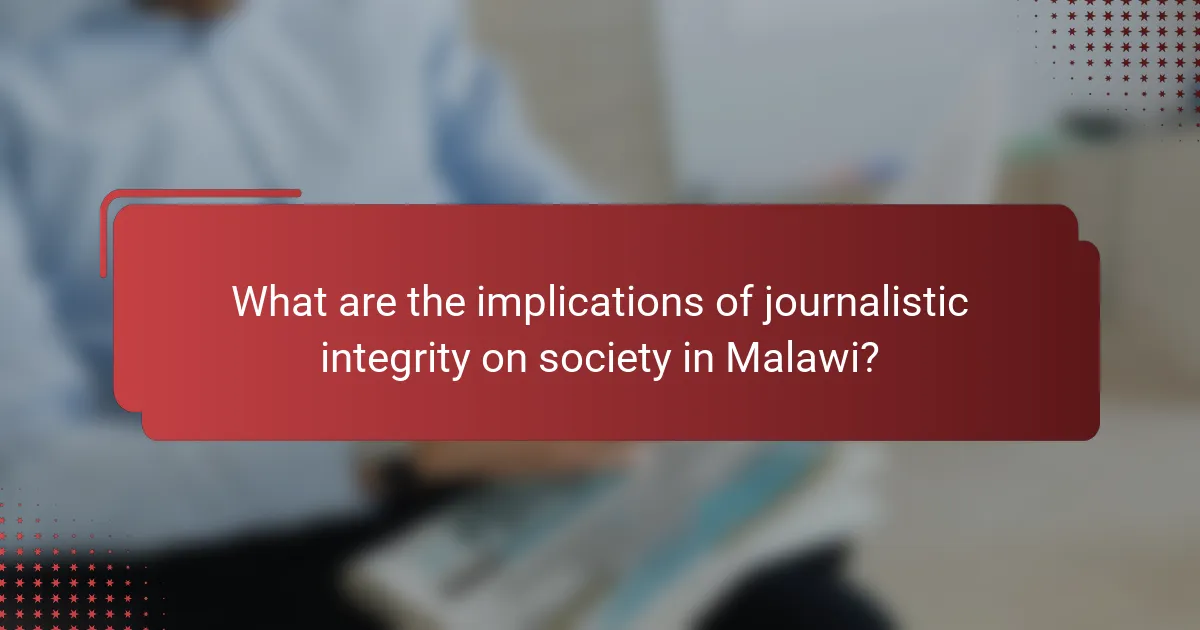
What are the implications of journalistic integrity on society in Malawi?
Journalistic integrity significantly impacts society in Malawi by fostering trust and accountability. When journalists adhere to ethical standards, they provide accurate and reliable information. This reliability enables citizens to make informed decisions on political, social, and economic issues. A study by the Media Institute of Southern Africa found that media credibility influences public perception of governance. High journalistic integrity can lead to increased civic engagement and participation in democratic processes. Conversely, a lack of integrity can result in misinformation and public distrust. This distrust can undermine democratic institutions and hinder social progress. Therefore, maintaining journalistic integrity is crucial for a healthy, informed society in Malawi.
How does journalistic integrity impact public opinion and awareness?
Journalistic integrity significantly influences public opinion and awareness. Integrity ensures accurate reporting, which builds trust among the audience. Trust in media sources leads to informed public discourse. A study by the Pew Research Center found that 62% of Americans believe that news organizations should prioritize accuracy over speed. When journalists adhere to ethical standards, misinformation decreases. This fosters a more educated citizenry, capable of making informed decisions. In Malawi, integrity in journalism can enhance democratic engagement. Enhanced public awareness leads to greater accountability from leaders and institutions.
What examples illustrate the effects of integrity in journalism on social issues?
Integrity in journalism significantly influences social issues by promoting accountability and transparency. For example, investigative journalism in Malawi uncovered corruption in government procurement processes. This reporting led to public outcry and demands for reform. Another instance is the coverage of human rights abuses, which raised awareness and prompted international scrutiny. Such integrity-driven reporting fosters a more informed public and encourages civic engagement. The Malawi Media Council emphasizes ethical standards to uphold journalistic integrity, reinforcing its importance in addressing social challenges.
How can improved journalistic integrity lead to social change in Malawi?
Improved journalistic integrity can lead to significant social change in Malawi by enhancing public trust in media. Trustworthy journalism empowers citizens with accurate information. This enables informed decision-making and promotes civic engagement. For instance, investigative reporting can expose corruption and hold leaders accountable. Increased accountability may result in better governance and public service delivery. Additionally, credible journalism can foster dialogue on social issues. This dialogue can mobilize communities to advocate for their rights. Ultimately, the media’s role in shaping public opinion is crucial for driving social reforms.
What best practices can enhance journalistic integrity in Malawi?
Implementing fact-checking processes can enhance journalistic integrity in Malawi. Fact-checking ensures accuracy in reporting. Journalists should verify information before publication. Training programs on ethical journalism can also improve standards. Such programs can educate journalists on responsible reporting practices. Transparency in sourcing information builds trust with the audience. Providing clear attribution for sources enhances credibility. Engaging with the community fosters trust and accountability in journalism. Regularly reviewing editorial policies can adapt to changing media landscapes. These practices collectively contribute to a more trustworthy media environment in Malawi.
How can journalists improve their adherence to ethical standards?
Journalists can improve their adherence to ethical standards by actively engaging in continuous education and training. Regular workshops on ethics can enhance their understanding of journalistic integrity. Establishing clear editorial guidelines helps maintain consistency in reporting. Seeking mentorship from experienced journalists can provide valuable insights into ethical practices. Additionally, fostering a culture of accountability within news organizations encourages ethical behavior. Implementing peer review systems can help identify potential ethical breaches before publication. Transparency in sourcing and fact-checking builds trust with the audience. These strategies collectively reinforce a commitment to ethical journalism.
What role does media literacy play in supporting journalistic integrity?
Media literacy plays a crucial role in supporting journalistic integrity. It enables individuals to critically analyze media content. This skill helps audiences discern credible information from misinformation. Enhanced media literacy fosters trust in reputable news sources. According to a 2020 study by the Pew Research Center, 64% of Americans believe media literacy is essential for understanding news. Furthermore, media literacy education promotes ethical consumption of news. It encourages audiences to question sources and verify facts. Ultimately, an informed public can hold journalists accountable, reinforcing integrity in journalism.
The main entity of this article is journalistic integrity in Malawi. The article outlines key principles such as accuracy, fairness, accountability, and independence that define journalistic integrity within the country. It discusses how these principles are essential for maintaining public trust in media and their role in promoting democracy. The article also highlights the challenges journalists face, including political pressure and censorship, and examines the implications of journalistic integrity on society and public opinion. Additionally, it presents best practices and strategies for enhancing ethical standards in journalism.
